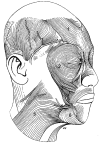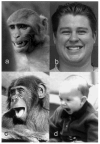Human facial expressions as adaptations: Evolutionary questions in facial expression research
- PMID: 11786989
- PMCID: PMC2238342
- DOI: 10.1002/ajpa.2001
Human facial expressions as adaptations: Evolutionary questions in facial expression research
Abstract
The importance of the face in social interaction and social intelligence is widely recognized in anthropology. Yet the adaptive functions of human facial expression remain largely unknown. An evolutionary model of human facial expression as behavioral adaptation can be constructed, given the current knowledge of the phenotypic variation, ecological contexts, and fitness consequences of facial behavior. Studies of facial expression are available, but results are not typically framed in an evolutionary perspective. This review identifies the relevant physical phenomena of facial expression and integrates the study of this behavior with the anthropological study of communication and sociality in general. Anthropological issues with relevance to the evolutionary study of facial expression include: facial expressions as coordinated, stereotyped behavioral phenotypes, the unique contexts and functions of different facial expressions, the relationship of facial expression to speech, the value of facial expressions as signals, and the relationship of facial expression to social intelligence in humans and in nonhuman primates. Human smiling is used as an example of adaptation, and testable hypotheses concerning the human smile, as well as other expressions, are proposed.
Copyright 2001 Wiley-Liss, Inc.
Figures






References
-
- Adolphs R. Social cognition and the human brain. Trends Cogn Sci. 1999;3:469–479. - PubMed
-
- Alexander RD. The biology of moral systems. Hawthorne, NY: Aldine deGruyter; 1987.
-
- Andrew RJ. The origin and evolution of the calls and facial expressions of the primates. Behaviour. 1962;20:1–107.
-
- Bavelas JB, Chovil N. Faces in dialogue. In: Russell JA, Fernandez-Dols JM, editors. The psychology of facial expression. New York: Cambridge University Press; 1997. pp. 334–346.
-
- Belsky J, Nezworski T. Clinical implications of attachment. In: Belsky J, Nezworski T, editors. Clinical implications of attachment. Hillsdale, NJ: Lawrence Erlbaum Associates; 1988. pp. 3–17.
Publication types
MeSH terms
Grants and funding
LinkOut - more resources
Full Text Sources

